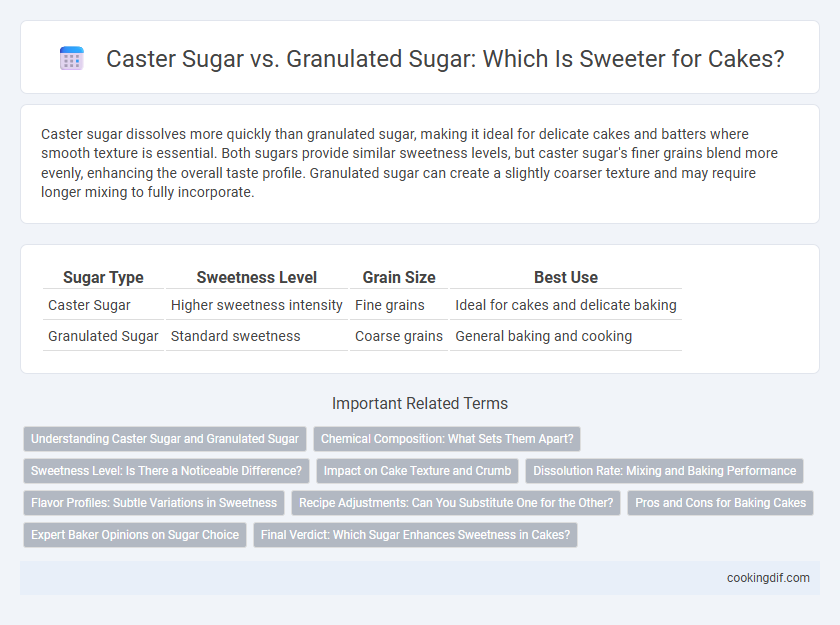Caster sugar dissolves more quickly than granulated sugar, making it ideal for delicate cakes and batters where smooth texture is essential. Both sugars provide similar sweetness levels, but caster sugar's finer grains blend more evenly, enhancing the overall taste profile. Granulated sugar can create a slightly coarser texture and may require longer mixing to fully incorporate.
Table of Comparison
| Sugar Type | Sweetness Level | Grain Size | Best Use |
|---|---|---|---|
| Caster Sugar | Higher sweetness intensity | Fine grains | Ideal for cakes and delicate baking |
| Granulated Sugar | Standard sweetness | Coarse grains | General baking and cooking |
Understanding Caster Sugar and Granulated Sugar
Caster sugar has finer crystals than granulated sugar, allowing it to dissolve more quickly and evenly in cake batters, which results in a smoother texture and consistent sweetness. Granulated sugar, with its coarser grains, may take longer to blend and can create a slightly grainy texture in delicate cakes. Understanding the distinct crystal sizes and dissolution rates of caster and granulated sugars is key to achieving optimal sweetness and texture in baking.
Chemical Composition: What Sets Them Apart?
Caster sugar and granulated sugar differ primarily in crystal size, impacting their dissolution rates and texture in cakes. Chemically, both sugars are primarily sucrose, but caster sugar's finer crystals allow faster blending and smoother batter consistency. This difference enhances sweetness perception in cakes, as caster sugar dissolves more evenly than granulated sugar during baking.
Sweetness Level: Is There a Noticeable Difference?
Caster sugar, with its finer granules, dissolves more quickly in cake batters, offering a smoother texture but similar sweetness compared to granulated sugar. Both sugars contain nearly identical sucrose content, resulting in negligible differences in overall sweetness levels. Taste tests reveal that sweetness perception remains consistent, making the choice between caster and granulated sugar primarily a matter of texture rather than sweetness intensity.
Impact on Cake Texture and Crumb
Caster sugar's finer crystals dissolve more quickly than granulated sugar, leading to a smoother batter and a finer, more tender crumb in cakes. Granulated sugar, with its larger crystals, may create a coarser texture and slightly denser crumb due to slower dissolution. Using caster sugar typically results in a lighter, more delicate cake texture, enhancing overall mouthfeel and sweetness distribution.
Dissolution Rate: Mixing and Baking Performance
Caster sugar dissolves faster than granulated sugar due to its finer crystals, resulting in a smoother batter and more consistent texture in cakes. Its rapid dissolution enhances mixing efficiency and ensures even sweetness distribution throughout the batter. Granulated sugar's slower dissolution can lead to slight graininess, affecting both the cake's crumb and rise during baking.
Flavor Profiles: Subtle Variations in Sweetness
Caster sugar has finer crystals than granulated sugar, allowing it to dissolve more quickly and evenly in cakes, enhancing a delicate sweetness without grit. Granulated sugar provides a more pronounced, slightly coarse sweetness that can add texture and a traditional flavor profile to baked goods. Choosing caster sugar results in a smoother, more consistent sweetness, while granulated sugar offers subtle variations that may influence the cake's overall flavor complexity.
Recipe Adjustments: Can You Substitute One for the Other?
Caster sugar has finer crystals than granulated sugar, allowing it to dissolve more quickly in cake batter, which can affect texture and sweetness perception. When substituting granulated sugar for caster sugar, it's essential to adjust mixing time to ensure proper dissolution and may slightly alter the cake's crumb. Caster sugar provides a smoother texture and can enhance sweetness without changing the overall sugar quantity in recipes.
Pros and Cons for Baking Cakes
Caster sugar, with its finer texture, dissolves more quickly than granulated sugar, resulting in a smoother batter and more consistent crumb in cakes. Granulated sugar adds texture and can create a slightly coarser crumb but may not blend as evenly, potentially leading to uneven sweetness. Using caster sugar often enhances cake rise and tenderness, while granulated sugar is more readily available and cost-effective but might require longer mixing to achieve proper dissolution.
Expert Baker Opinions on Sugar Choice
Expert bakers emphasize that caster sugar's fine texture dissolves more quickly and evenly in cake batters, enhancing sweetness perception and crumb softness compared to granulated sugar. Granulated sugar's coarser crystals may result in a slightly grainier texture and less uniform sweetness distribution, making caster sugar a preferred choice for delicate cakes. Professional advice often highlights caster sugar for its ability to create a smoother, more tender crumb and balanced sweetness.
Final Verdict: Which Sugar Enhances Sweetness in Cakes?
Caster sugar, with its finer texture, dissolves more quickly than granulated sugar, leading to a smoother, more evenly sweetened cake crumb. Granulated sugar may leave a slightly grainy texture, affecting the perceived sweetness distribution. For optimal sweetness and texture, caster sugar is the preferred choice in cake baking.
Caster Sugar vs Granulated Sugar for sweetness Infographic

 cookingdif.com
cookingdif.com